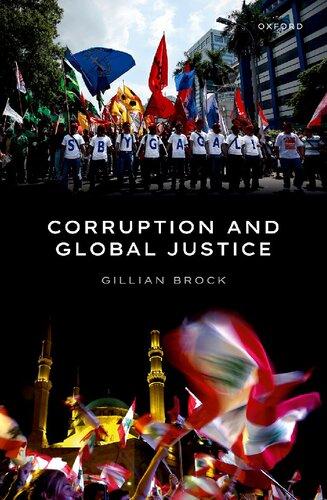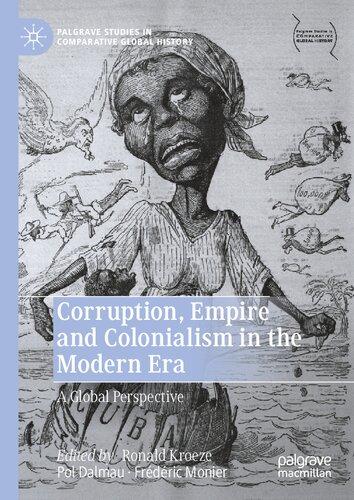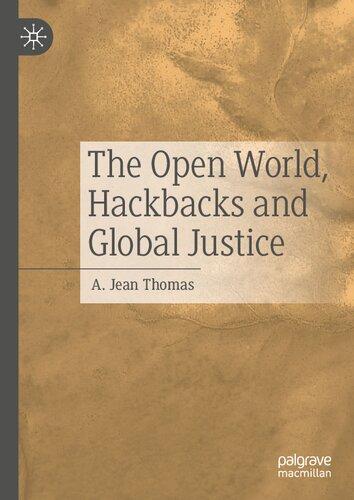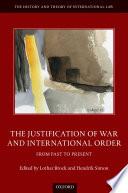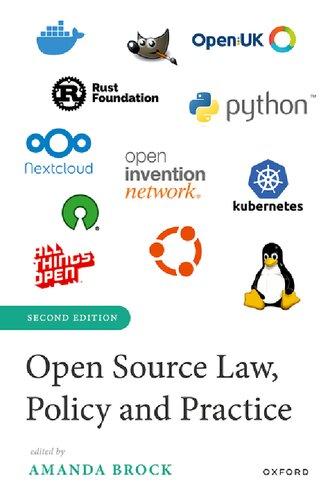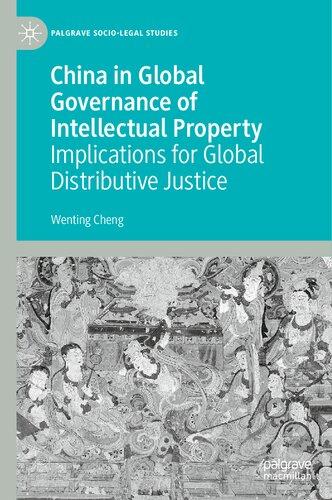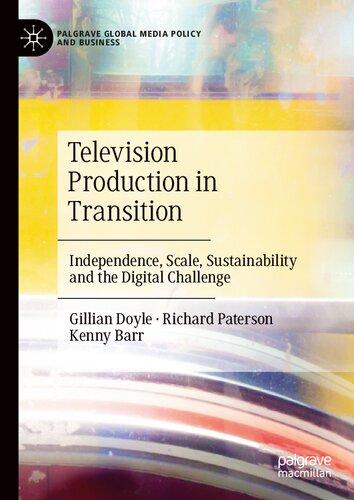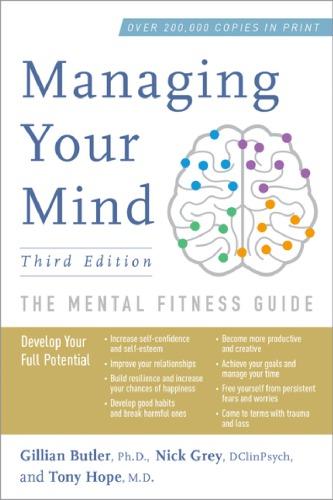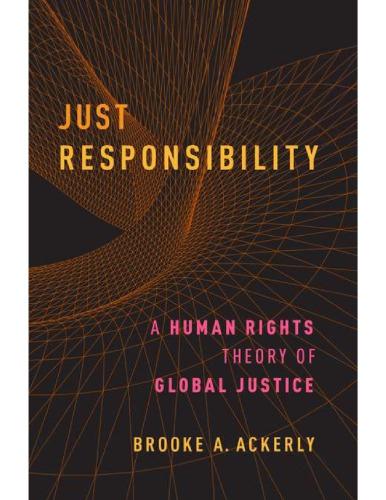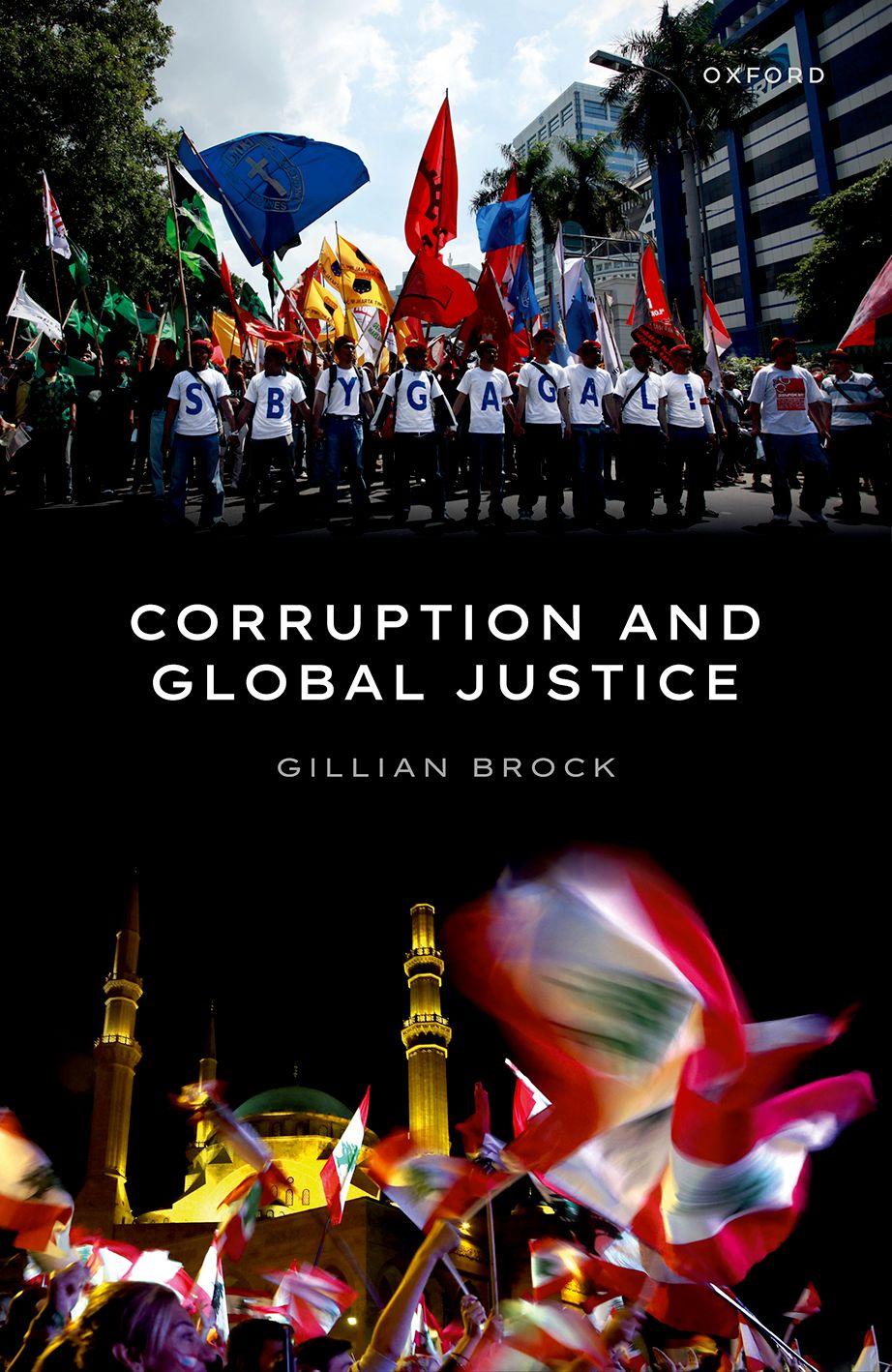Corruption,Responsibilities,and GlobalJustice
AnIntroduction
1.1Introduction
OntheeveningbeforeMohammedBouazizilita firethatwouldburn acrosstheArabworld,theyoungfruitvendortoldhismotherthatthe oranges,datesandappleshehadtosellwerethebesthehadeverseen.
“Withthisfruit,” hesaid, “Icanbuysomegiftsforyou.Tomorrow willbeagoodday.”
Foryears,Bouazizitoldhismotherstoriesofcorruptionatthefruit market,wherevendorsgatheredunderaclusterof ficustreesonthe mainstreetofthisscruffytown,notfarfromTunisia’sMediterranean beaches.Arrogantpoliceofficerstreatedthemarketastheirpersonal picnicgrounds,takingbagfulsoffruitwithoutsomuchasanod towardpayment – finingthem,confiscatingtheirscales,evenorderingthemtocarrytheirstolenfruittothecops ’ cars.¹
ThedayBouazizihadhopedforwentratherdifferently.Policeofficialsvisitedhis stallanddemandedbribes.Hehadnofundsthatday,soanofficialslappedand spatathim,beforeconfiscatinghisweighingscalesanddislodginghisproduce cart.Bouazizitriedtoreclaimhispropertyatthemunicipalbuildingbutwas beatenoncemore.Sohesetouttothegovernor’sofficewherehewasdenied accesstopleadhiscase.Surroundedbycorruptionandunresponsivenesstohis plight,feelingthatthefutureheldnohopeofchange,onDecember17,2010, MohammedBouazizi,pouredgasolineoverhisbodyandsethimselfon fire.His actinspiredmanycivilianstoprotestacrossNorthAfricaandtheMiddleEast, leadingtoamovement,theArabSpring,inwhichmillionsofcitizensunder autocraticrulebeganchallenginggovernmentalabuseofpowerandunresponsivenesstocitizens’ needs.
¹MarcFisher, “InTunisia,ActofOneFruitVendorSparksaWaveofRevolutionthroughArab World,” WashingtonPost,March26,2011.
Whilelong-suppressedvictimsofcorruptioncaneventuallytakeactionif sufficientlyoutraged,demandsforbribesrarelyresultinsuchadramaticchain ofevents.Morefrequently,theyelicitreluctantcompliance.Thedailylivesofthe poorindevelopingcountriesarerifewithfacilitationpaymentexpectations, presentingrealcoststosomeoftheworld’smostvulnerable.Corruptioncan interferemassivelywithpeople’sabilitiestomeettheirbasicneeds,suchasfor healthcareoreducation.Manyofthepooracrosstheworldreporthavingtopay bribesinordertosecureprovisionofapublicservicetowhichtheyareentitled. AstudyofseveralAfricancountriesrevealedthat44percentofparentshadpaid bribestoteacherstoplacetheirchildreninschoolsandthatwithoutsuch payment,accesswouldhavebeendenied.²Similarresultsarecommoninmany countries.³Aglobalstudyfoundthat1.6billionpeopleannuallyareforcedtopay bribestogetpublicservices.Healthcareistheworstaffectedsector.One-tenthof allGlobalCorruptionBarometerrespondentsacrosstheworldreporthavinghad topayabribewithinthelastyeartoahealthcareworker.⁴
Sadly,thisisnotanewphenomenon.Corruptionhasexistedsincehistorical recordshavebeenkept.Whiletheformsofcorruptionanditsscalemightvary,it appearstoexistinallsocietiesatallstagesofdevelopment.Giventhepervasive natureofcorruptionanditsmanyforms,itislittlesurprisethatcorruption featuresasoneofthemostpressingconcernsacrosstheglobe.⁵ Priortothe Covid-19pandemic,corruptionwasthemostfrequentlydiscussedtopicglobally
²Arbache,JorgeSaba,Habyarimana,James,andMolini,Vasco. SilentandLethal:HowQuiet CorruptionUnderminesAfrica’sDevelopmentEffort (English).AfricaDevelopmentIndicators (WashingtonDC:WorldBankGroup,2010).Availableat:http://documents.worldbank.org/curated/ en/316051468009960660/Silent-and-lethal-how-quiet-corruption-undermines-Africas-development-efforts.
³TransparencyInternational, “GlobalCorruptionBarometer:Overview,” Transparency International,2017.Availableat:https://www.transparency.org/en/gcb/global/global-corruptionbarometer-2017;TransparencyInternational, GlobalCorruptionBarometer:Asia2020 (Berlin: TransparencyInternational,2020);TransparencyInternational, GlobalCorruptionBarometer: MiddleEastandNorthAfrica2019 (Berlin:TransparencyInternational,2019);Transparency International, GlobalCorruptionBarometer:Africa2019 (Berlin:TransparencyInternational,2019); TransparencyInternational, GlobalCorruptionBarometer:LatinAmericaandtheCaribbean2019 (Berlin:TransparencyInternational,2019);TransparencyInternational, GlobalCorruptionReport: Education (NewYork:Routledge,2013).AlltheGlobalCorruptionBarometerReportscanbefound at:https://www.transparency.org/en/gcb.
⁴ RichardRoseandAranzuzuMontero, ReducingBriberyforPublicServicesDeliveredtoCitizens (Bergen:U4Brief,2015),2.Availablehere:https://www.cmi.no/publications/5663-reducing-briberyfor-public-services-delivered-to#pdf.
⁵ UnitedNations, “OpeningSpecialSessiononCorruption,GeneralAssemblyAdoptsPolitical DeclarationwithRoadmapstoHelpCountriesTackleBribery,Money-Laundering,AbuseofPower,” UnitedNations,June2,2021.Availablehere:https://www.un.org/press/en/2021/ga12329.doc.htm.For themostup-to-dateresultschecktheIPSOSwebsitewhichrunsmonthlysurveystitled “WhatWorries theWorld,” availableat:https://www.ipsos.com/en/what-worries-world-july-2022.TheFebruary2022 datasuggestthatcorruptionwasonceagainatopconcern,beforetheinvasionofUkraineand inflationbecameevenmoreprominent.Corruptionstillfeaturesinthelistoftopproblems,despite thesedevelopments.ForolderdataseealsoLeslieHolmes, Corruption:AVeryShortIntroduction (Oxford:OxfordUniversityPress,2015),xiii;andWIN/GallupInternational, CorruptionTopstheList astheWorld’sMostImportantProblemAccordingtoWIN/GallupInternational’sAnnualSurvey
andoftenidentifiedastheworld’stopproblem.⁶ Itissowidespreadthatthose seekingpublicofficeoftencampaignonananti-corruptionplatform,claimingthat theywouldheraldanewdawn.However,citizensareoftendisappointedto find theydonotseemtoescapethescourgeofcorruptionandthatthenewlyelectedfare nobetterthantheirpredecessors,perhapsevenexacerbatingtheproblems.
What,ifanything,successfullyaddressescorruption?Andassumingwecan identifysomeeffectivesolutions,whatoughttobedonetoaddresscorruption hereandnow?Howshouldweassignresponsibilitiesinconnectionwithaddressingcorruption?InthisworkIexploretheissueofwhatoughttobedoneabout thisgraveproblem,whooughttodoit,andthejustificationforfairresponsibility assignments.Iofferspecificsuggestionsaboutparticularparties’ responsibilities andthenormativebasisfortheseviews.Myfocusinthisbookisonthenormative issues.However,todothisworkwellweneedtounderstandthephenomenon ofcorruptionandthekindsofstrategiesthataresuccessfulinreducingtherisks ofitsoccurrence.Studyingcorruptioncomprehensivelyisamulti-disciplinary endeavor.Weneedtounderstandsomeofthecomplexfacilitatorsofcorruption tohaveanyhopeofreducingit.Inthischapterwebeginourunderstandingby firstgettingasenseofthemanyformscorruptioncantake(inSections1.2,1.3, and1.4).Section1.5beginstoexploresomeofthedriversofcorruptionwhile Section1.6providesmapsofhowwewillnavigatethiscomplexterrain.Ioffertwo kindsofmaps,a “bigpicture ” versionandamoregranularoverviewofeach chapterthatsummarizessomekeythemesfromeach.Section1.7clarifieswhy normativetheoristsshould findmyprojectvaluable,highlightingseveraloriginal aspectstomybook.Section1.8clarifiesmypositiononthecomplexconceptual issuesaboutcorruption,someofwhichmustberelegatedtofutureresearch,given theenormousnormativeprojectthatismyfocushere.Section1.9concludesand onceagaindrawsattentiontoourmainconcerninthisbook,namely,thekindsof corruptionthatthwarteffortstoreduceglobalinjustices.Linkingtothenext chapter,Iintroducethecaseofcorruptioninthewatersector,acasethatwe exploreinChapter2.
1.2FormsofCorruption:AnIntroduction
Abroadassortmentofactivitiescanrightlybedescribedascorrupt,including nepotism,inappropriatefavoritismforassociates,fraud,extortion,kickbacks,
(Bulgaria:GallupInternationalCenterforPublicandPoliticalStudies,2014)availablehere:https:// www.gallup-international.bg/en/32507/corruption-tops-the-list-as-the-worlds-most-important-problemaccording-to-win-gallup-internationals-annual-poll/.
⁶ Formoresourcesseethepreviousfootnote.TheIPSOSwebsitehasarichdatabaseofmonthly surveystitled “WhatWorriestheWorld,” availableat:https://www.ipsos.com/en/what-worries-worldjuly-2022.
electionrigging,votebuying,bribery,statecapture,cronyism,andinfluence peddling.Someoftheprominentformsofcorruptionthataremosttroubling arethoseinwhichagentsusepublicofficeorprofessionalroles,typicallyforsome personalorpoliticalgain,inwayscontrarytothepurposeofthatofficeorrole, therebyabusingtheirentrustedpower.⁷ Thesekindsofinappropriateusesof publicofficeorprofessionalroleswillbemyprimaryconcerninthisbook. Becauseagentscanbeengagedinarangeofinappropriateactivitiesinthese roles,wewillbeconcernedwithadiversesetofactivities.
Whilehavingtomakefacilitationpaymentsintheformofbriberyorteamoney maybeacommonandhighlyvisibleformofcorruptionthatinfectspoorpeople’ s everydaylives,otherequallypernicioustypesarerampantevenwhentheyareless visible.Statecapture,forinstance,involvesnetworksorgroupsgainingcontrolof thestate’sdecision-makingcapacities,therebyensuringpoliciesarefavorableto theirinterests.Thiscanengenderregulationsorresource flowsthatconsistently prioritizetheirinterests,oftenattheexpenseoftheinterestsofotherswithwhom thestateshouldbeconcerned.Adistinctionisalsofrequentlydrawnbetween pettyandgrandcorruption.Ordinarycitizensoftenencounterpettycorruptionin theireverydaylives,suchaswhenfacedwithpolicedemandingbribesoran administratorexpectingafacilitationpaymentbeforeallowingaccesstohealthcare.Grandcorruptionoftenoccursatahigherlevel,forinstancewhenaminister authorizesaprojectinreturnforbribesorotherfavors.
Havingbegunthischapterbynotingtheprevalenceofbriberyandcorruption insomeoftheworld’spoorestregions,itisimportanttoacknowledgethat corruptionisfoundinthemostaffluentnationsaswell,ofcourse.Indeed,some
⁷ Thisismybriefstatementofthekindofcorruptionthatisamongthemosttroublinganditdraws oncriticalreflectionsfromtheliterature.IdiscusssomeoftheconceptualissuesintheAppendix. ImportantearlyaccountsincludethoseofJosephNye, “CorruptionandPoliticalDevelopment:ACostBenefitAnalysis,” AmericanPoliticalScienceReview 61(1967):417–27;RobertKlitgaard, Controlling Corruption (Berkeley:UniversityofCaliforniaPress,1988);MarkPhilp, “DefiningPolitical Corruption,” PoliticalStudies 45(1997):436–62)doi:10.1111/1467-9248.00090;JeremyPope, NationalIntegritySystems:TheTISourceBook (Berlin:TransparencyInternational,1997);Susan Rose-Ackerman, CorruptionandGovernment:Causes,ConsequencesandReform (Cambridge: CambridgeUniversityPress,1999);DennisThompson, EthicsinCongress:FromIndividualto InstitutionalCorruption (WashingtonDC:BrookingsInstitute,1995);MarkWarren, “WhatDoes CorruptionMeaninaDemocracy,” AmericanJournalofPoliticalScience,48(2):328–43.doi:10.2307/ 1519886;LawrenceLessig, “InstitutionalCorruptions,” EdwardJ.SafraWorkingPapers 1(2013):1–20, doi:10.2139/ssrn.2233582;SeumasMiller, InstitutionalCorruption:AStudyinAppliedPhilosophy (NewYork:CambridgeUniversityPress,2017)doi:10.1017/9781139025249;BoRothsteinand AiyshaVarraich, MakingSenseofCorruption (Cambridge:CambridgeUniversityPress,2017) doi:10.1017/9781316681596;EmanuelaCevaandMariaPaolaFerretti, “PoliticalCorruption, IndividualBehaviorandtheQualityofInstitutions,” Politics,PhilosophyandEconomics 17(2018): 216–31doi:10.1177/1470594X17732067;andEmanuelaCevaandMariaPaolaFerretti, Political Corruption:TheInternalEnemyofPublicInstitutions (NewYork:OxfordUniversityPress,2021). IhavealsofoundideasfromInternationalNon-GovernmentalOrganizationssuchasTransparency Internationalparticularlyclearandusefulaswell.Forexcellentfurtherreadingseeforinstance, EmanuelaCevaandMariaPaolaFerretti, “PoliticalCorruption,” PhilosophyCompass 7(2017):1–10. doi:10.1111/phc3.12461;SeumasMiller, “Corruption,” StanfordEncyclopediaofPhilosophy,EdZalta (ed.),September21,2018.Availableat:https://plato.stanford.edu/entries/corruption.
ofthemostworryingformsaretobefoundintheworld’srichestnations.To illustrate,andtogetasenseofcorruption’sscale,reach,andcomplexity,inthe nexttwosectionsIdiscusssampleformsofinstitutionalcorruptioncommonin westerndevelopedcountries.Inthesesectionswecovertwoconcerningareasthat haverippleeffectsthroughouttheglobe.Theseare:
(i)Animproperlycloseinter-dependencebetweenbusinessandgovernment, especiallytheUSCongress’simproperdependenceoncampaign contributions;
(ii)Thepharmaceuticalindustry’simproperlyinfluentialroleinhealthcare practice,policy,medicalresearch,andintheproductionofknowledge.
1.3AnImproperlyCloseInter-dependencebetween BusinessandGovernment
Thereareatleastthreerelationshipsbetweenbusinessandgovernmentthat facilitatebusiness-friendlyregulationandlegislation.Theseincludetheprovision offundingforcampaignstoelectcandidates,anintenselobbyingindustrythat targetsthosewithdecision-makingandrule-writingpower,andtheso-called revolvingdoorbetweengovernmentandprivatesectoremployment.Theserelationshipsfacilitatebusinesseshavingbetteraccesstopublicdecision-makers,so thatthesedecision-makersbendinthedirectionofpromotingtheirinterests.
1.3.1CampaignContributions
Howeffectivearecampaigncontributionsatsecuringbusiness-friendlypolicies? Theshortansweristhattheycanbeveryeffective.AmericanCrystalSugar contributed$1.8million(US)during2013and2014,whileitreceived$280 millioninsugarsubsidiesoverthatperiod.⁸ Altria,formerlycalledPhilip Morris,isoneofthelargestcontributorstoelectioncampaigns.Therehasbeen alonghistoryofstrugglingtoregulatethesaleoftobaccoproducts.Duringthe period2007to2012,GoldmanSachscontributed$16.5milliontofundpolitical campaigns,spent$12.4milliononlobbyingandwasawardedtotalfederalcontractsandsupportworth$229.4million.LockheedMartingave$8.6millionin politicalcontributions,spent$84.1milliononlobbying,andreceived$332million
⁸ MalcolmSalter, “CronyCapitalism,AmericanStyle:WhatAreWeTalkingAboutHere?” Edmond JSafraWorkingPaper 50(2014):1–47.Availablehere:https://papers.ssrn.com/sol3/papers.cfm? abstract_id=2513352.
infederalcontractsandsupport.⁹ Aresuchfactsmerelycoincidenceorasignof somethingmoredisturbing?
Manyindustrieshavebenefitedgreatlyfromgovernmentfavoritismfollowing generouscampaigncontributionsandlobbying.Butdosuchpatternsnecessarily indicatecronycapitalismisinplay,ratherthanafairexchangeorlegitimate bargaining?¹⁰ Particularcasesmaysuggestoneinterpretationratherthananother. Whateverwethinkofthemeritsofindividualpolicydecisionsfavoringparticular donors,therearethreeothernoteworthyaspectsofthesystemofcampaign contributionsthatcorruptsthewaytheinstitutionsofgovernmentwork.
1). Timedistortion:Thereistheneedtoengageincontinuousfundraisingthat distractsmembersofCongressfromwhatyoumightthinkaresomeof theircorepurposes,suchasdeliberatingaboutpoliciesandlegislationor tendingtoconstituents.StudiesshowthatmembersofCongressspend 30–70percentoftheirtimeonfundraising.¹¹
2). Agendadistortion :CampaigncontributorsgetpreferentialaccesstomembersofCongressandarethusdisproportionatelyabletoinfluencebeliefs andagendas.Thisoftenresultsinagapbetweenhowrepresentatives actuallyspendtheirtimeandwhatthepeoplethinkareimportantissues. Adistortioncreepsin.AsLarryBartels’ researchshows “senatorsappearto bevastlymoreresponsivetotheviewsofaffluentconstituentsthanto constituentsofmodestmeans”.¹²
3).Thereisahuge lossoftrust inthepoliticalsystem.¹³Fewercitizens thereforeengageinpracticesofdemocracyenablingfurtheropportunities forfunderstohavedisproportionateinfluenceindeterminingpolitical outcomes.Alternatively,disillusionedandangrycitizensdon’tjustget mad,theysometimesregisterthatdisapprovalinwaysthatpunishanyone identifiedwiththestatusquoinfavorofchange,howeverill-defined.¹⁴
Whenlargecampaigncontributionsarestandardlyrequiredtobeelectedto office,weshouldnotbesurprisedtodiscoverthatgovernmentpoliciesbendinthe
⁹ FormoreonsuchdataseeLaurenceCockcroftandAnne-ChristineWegener, Unmasked: CorruptionintheWest (London:I.B.Tauris,2017).
¹
⁰ Salter, “CronyCapitalism,AmericanStyle:WhatAreWeTalkingAboutHere?” 5.
¹¹BrentFerguson, “CongressionalDisclosureofTimeSpentFundraising, ” CornellJournalofLaw andPublicPolicy 23(1)(2013)..Availableat:https://scholarship.law.cornell.edu/cjlpp/vol23/iss1/1.
¹²LarryBartels, “EconomicInequalityandPoliticalRepresentation,” inLawrenceJacobsand DesmondKing(eds.), TheUnsustainableAmericanState (Oxford:OxfordUniversityPress,2009), 187.Availablehere:DOI:10.1093/acprof:oso/9780195392135.003.0007.
¹³LawrenceLessig, RepublicLost:HowMoneyCorruptsCongress andaPlantoStopit (Boston: Hachette,2011);LawrenceLessig, America,Compromised (Chicago:UniversityofChicagoPress, 2018).
¹⁴ See,forinstance,FinnHeinrich, “CorruptionandInequality:HowPopulistsMisleadPeople,” TransparencyInternational,January24,2017.
directionoftheirmajorfunders.¹⁵ Thosewhoareelectedarepressuredby generousfunderstoreciprocatefavors,atleastinbeingwelldisposedtopromote theirfunders ’ interests.Thepsychologicalprocessesinplayrundeepinour humandispositionstoreciprocate.¹⁶
1.3.2CorruptionBasedonLobbying
Theverypurposeoflobbyingistoinfluencegovernmenttowardthelobbyist’ s position.Businessgroupsemploythemostlobbyistsandvastlyoutspendother interestgroups.Lobbyingtostopbusiness-unfriendlypoliciesfromprogressingis justascommonaslobbyingtopromotebusiness-friendlydecisions.BigPharma spent$116milliononlobbying “tokeepCongressfromauthorizingMedicareto bargaindownprescriptiondrugprices” and “saved$90billioninfutureprofits, representingareturnoninvestmentof77500percent. ”¹⁷ Thescaleanddeep pocketsthatcansupportlobbyingactivitymeansthatthepublicinterestcanbe seriouslysubverted.
1.3.3CorruptionBasedontheRevolvingDoor
Thesteadytrafficfromgovernmentservicetoprivatesectoremploymenthas corruptedthepoliticalprocessinseveralways.Alargenumberofpeoplego throughtherevolvingdoor,includingthosecongressionalemployeeswhohave vastlegislationandregulativeexperience.Thesalaryincreasemovingfromgovernmenttoothersectorscanbequitesignificant,especiallyforstaffandlegislative assistants.¹⁸ Thepharmaceutical,bioscience,and financialindustriesarefrequent recruiters.Therearetwowaysinwhichthesetransitionscompromisethedemocraticprocess.First,theprospectoffuturelucrativeemploymentintheprivate sectorcaninfluencethedecisionsofthosecurrentlyingovernmentservicejobs
¹⁵ FormoreonregulatorycaptureseeGeorgeStigler, “TheTheoryofEconomicRegulation,” Bell JournalofEconomicsandManagementScience 2(1971):12.
¹
⁶ LawrenceLessig, RepublicLost:HowMoneyCorruptsCongress andaPlantoStopit (Boston: Hachette,2011).
¹
⁷ Salter, “CronyCapitalism,AmericanStyle:WhatAreWeTalkingAboutHere?” 27.Availableat: https://papers.ssrn.com/sol3/papers.cfm?abstract_id=2513352.CitingresearchdonebyAimeeDuffy, “ShouldCompaniesDoMoretoDisclosetheirLobbyingEfforts?” TheMotleyFool,April5,2014. Availableat:https://www.fool.com/investing/general/2014/04/05/should-companies-do-more-to-disclosetheir-lobbyin.aspx.
¹⁸ IntheUSA,theHonestLeadershipandOpenGovernmentActissupposedtoconstrainthis pattern,asitimposesrestrictionsof1–2yearsonsenatorsandHousestaffbeingabletoengagein lobbyingstraightafterleavingoffice.Howwellitactuallyworksinpracticetoconstrainanyoneis anothermatterand,ofcourse,itonlyappliestothoseintheUSAsothetroublingphenomenon continuesacrosstheworld.
whoseenoneedtoantagonizefutureemployers.¹⁹ Second,insidershavespecific knowledgeofhowgovernmentworksthatcanconsiderablyassistcompaniesor industryassociationsinpromotingpoliciesfavorabletotheirinterestsatthe expenseofthepublic.Publicawarenessoftheproblemfuelsfurtherdistrustand angerinthepoliticalsystem.
1.4CorruptingHealthcareandMedicalandHealthKnowledge
InthissectionIdiscusssomeofthewaysinwhichpharmaceuticalcompanies havecorruptedthepracticeofhealthcareintheUS.Patientscommonlyassume thathealthcarepersonnelusethebestmedicalknowledgetotreatconditionsand illnesses.Buttherealityfallstroublinglyshortofthisassumption.Ibeginwiththe captureofKeyOpinionLeaders,apracticethatiswidespreadinthehealthsector. Theyareanintegralpartofpharmaceuticalcompanies’ commerciallydriven effortstoshapethemedicalknowledgethatphysiciansuseinmakingtheirclinical decisions.Wearethenwellpositionedtounderstandhowdrugcompanies corruptourknowledgeabouttheproductstheysell.
1.4.1TheCaptureofKeyHealthcareProfessionals
InSergioSismondo ’srevealingexposéofpharmaceuticalindustrytactics,he documentstheinsidiouswaysinwhichtheindustryhasinfiltratedhealthcareat everylevel.²⁰ KeyOpinionLeaders(KOLshenceforth)inthehealthcareprofession arecarefullymanagedaskeyagentsindisseminatingproduct-friendlyinformationatcontinuingmedicalprofessionaldevelopmentseminars,andshapingwhat countsasmedicalknowledge.KOLsarecriticalpersonnelinmarketingandsales strategies.²¹KOLscanbeveryeffectiveatgeneratingsales.AMerckstudyrevealed thatKOL-ledmeetingswithphysiciansalmostdoubledtheirreturnoninvestment thanwhenmeetingswereledbysalesrepresentatives.²²Soitisworththe
¹⁹ Thereisalsoanotinsignificant flowfromtheprivatesectortogovernmentintheso-calledreverse revolvingdoor.Forinstance,industryveteransfromthehealthcaresectorwrotemuchofthe final wordingoftheAffordableCareAct.Themovementofinfluentialindustryveteransintogovernment positionsstrengthenspersonal, financial,andideologicalties.Itcanalsoleadtoregulatorycapture, privilegedaccess,andaperceptionthatpublicdecisionmakingisoverlyinfluencedbytheprivate sphere.Considerhow,forinstance,overthelastfortyyearstenTreasurysecretariescamefromthe businesscommunity;the flowfromGoldmanSachsinparticularisnoteworthy.Itshouldbeno surprisewhentheWallStreetworldviewoverlyinfluencespublicpolicy.Formore,seeSalter, “Crony Capitalism,AmericanStyle” .
²⁰ SergioSismondo, “‘You’reNotJustaPaidMonkeyReadingSlides:’ HowKeyOpinionLeaders ExplainandJustifyTheirWork,” EdmondJ.SafraWorkingPaper 26(2013):1–29.
²¹Sismondo, “You’reNotJustaPaidMonkeyReadingSlides” ²²Sismondo, “You’reNotJustaPaidMonkeyReadingSlides” .
industry ’stimetotrainphysicians,convertthemintoproductchampions,andpay themtogivepromotionallectures.Physiciansarepaidwellforgivingpromotional talksforpharmaceuticalcompanies.²³Physiciansreportfurthermotivational reasonsfortakingonthiswork,includingincreasedstatusorrespect,theopportunitiestonetworkwithotherphysicians,thepotentialforreferrals,beingatthe forefrontoftheir fields,andlearningaboutnewproducts.
CompaniestypicallyscreenKOLs ’ talks.Someevenprovidethescriptsand slidestobeusedthatpresenttheirproductsinthebestlight.WhileKOLsmightbe awareofconflictsofinterest,theytalkasiftheycanbeentirelytrustedtomanage thesethemselves.However,wearenotgoodjudgesofwhataffectsusindecisionmakingwhenconflictsofinterestareinplay.Asoneexample,GenevievePhamKanterreviewedthevotingpatternsand financialinterestsofabout1400Food andDrugAdministration(FDA)advisorycommitteememberswhoparticipated indecisionsfortheCenterforDrugandEvaluationResearchfrom1997to2011; shemonitoredover15739votesandfoundaclearpatternsofbias.²⁴ Thescaleof theproblemmaynotbewidelyrecognized.In2007, “94percentofphysiciansin theUnitedStateshadsuchrelationships.Morethan80percentofdoctorshad acceptedgifts,and28percenthadreceivedpaymentsforconsultingorresearch. Sixtypercentofthosephysicianswereinmedicaleducationand40percentwere involvedinwritingpracticeguidelines.”²⁵
Bysponsoringeventsandtravel,pharmaceuticalcompaniescancreateasense ofgoodwilltowardsphysicians.Physiciansoftenhavetheirtraveltoluxuryresorts sponsoredbydrugcompanies,ostensiblyforcontinuingeducationonnewdrugs. Whilemostphysiciansbelievethatsucharrangementsdonotinfluencethem,data suggestotherwise.Onestudyshowedthatprescriptionsforparticulardrugs pluggedbythedrugcompaniessponsoringameetingnearlytripledsoonafter thatmeeting.²⁶ Otherstudieshaveshownthatphysicianswhoacceptdrugcompanygiftsrequestthattheirdrugsbeaddedtohospitalformulariesmorefrequentlythanaverage.²⁷
²³Forinstance,morethan2500physiciansintheU.S.werepaidatleast$500000eachyearfor givingpromotionaltalks,duringtheperiod2014–2019.CharlesOrnstein,TracyWeberandRyan GrochowskiJones, “WeFoundOver700DoctorsWhoWerePaidMorethanaMillionDollarsbyDrug andMedicalDeviceCompanies,” ProPublica,October17,2019.Availablehere:https://www. propublica.org/article/we-found-over-700-doctors-who-were-paid-more-than-a-million-dollars-bydrug-and-medical-device-companies.
²⁴ GenevievePham-Kanter, “RevisitingFinancialConflictsofInterestinFDAAdvisory Committees,” TheMilbankQuarterly 92(2014):446–70.Shealsonotesthat “FDACenterforDrug EvaluationandResearchadvisorycommitteememberswhohave financialtiessolelytothe firm sponsoringthedrugunderreviewaremorelikelytovoteinwaysfavorabletothesponsor,” at446. Furthermore,inabouthalfofallFDAmeetingsin2013,atleastoneparticipanthadsome financial interestatstake,suchasconsulting,advising,oranownershipinterest.
²⁵ Pham-Kanter, “RevisitingFinancialConflictsofInterestinFDAAdvisoryCommittees,” 2.
²⁶ AaronE.Carroll, “Doctors’ MagicalThinkingAboutConflictsofInterest” TheNewYorkTimes, Sept8,2014.
²⁷ Carroll, “Doctors’ MagicalThinkingAboutConflictsofInterest” .
Patientsalsothinkgiftsarelessappropriateandmoreinfluentialthandoctors do.Publicsentimentabouttheimproprietiesfueledbipartisansupportforthe PhysicianPaymentsSunshineActthatbegantoapplyin2013.Itrequiresthat mostpaymentstophysiciansfromindustrybereportedinapublicdatabase, includingmeals,travelexpenses,speakerfees,andresearchgrants,alongwithany ownershipstakesincompanies.Theideaisthatbymakingthesetypesofrelationshipspublic,biascanbemanaged.
TheActhasresultedinsomechangesinbehavior,withdoctorslimiting acceptanceofinvitationsandgiftsfromdrugcompanies,butthepracticecontinuesnevertheless.PhysiciansopposedtotheSunshineActarguethatphysicians shouldself-regulate.Butresearchonconflictsofinterestrevealscontraryevidence abouthowreliablethiswouldbe.Onestudyofradiationoncologistsfoundthat only5percentofthemthoughtthattheymightbeaffectedbygifts.However,a thirdthoughtthatotherradiationoncologistswouldbeaffected.Similarstudies havebeendoneonotherhealthcareprofessionals,suchasmedicalresidents. Whilemorethan60percentsaidthatgiftswouldnotinfluencetheirdecisions, only16percentbelievedthatotherresidentswouldbeuninfluenced.²⁸ Such “‘magicalthinking’ thatsomehowwe,ourselves,areimmunetowhatweare surewillinfluenceothersiswhyconflictofinterestregulationsexistinthe first place.Wesimplycannotbeaccuratejudgesofwhat’saffectingus.”²⁹
Acknowledgingtherealityofconflictsofinterestandhowtheyinfluenceusis animportantpartoftryingtodealwiththem.
1.4.2CorruptioninOurKnowledgeofDrugEfficacy
Drugcompaniescorrupthealthcareinseveralotherimportantways.Donald Light,JoelLexchin,andJonathanDarrodocumentatleastthreeimportant problems.³⁰ First,isalackofintegrityinthedrugtrialstheyconduct.
1.4.2.1CorruptionoftheDrugTrials
Drugcompaniesareresponsiblefortestingtheirownproductsandthishasled themtodesigntrialsthatwillputtheirbrandsinthemostfavorablelight.³¹Design flawsincludenottestingappropriatelyforharmsbutratherensuringthecollectionofdatathatsuggestgreatestbenefits.Drugcompaniesalsodecidewhoshould beacceptedontoadrugtrial,whichmeanstheyhavelargeincentivestoinclude
²⁸ Carroll “Doctors’ MagicalThinkingAboutConflictsofInterest”
²⁹ Carroll “Doctors’ MagicalThinkingAboutConflictsofInterest” .
³⁰ DonaldLight,JoelLexchin,andJonathanDarro, “InstitutionalCorruptionofPharmaceuticals andtheMythofSafeandEffectiveDrugs,” JournalofLaw,MedicineandEthics,41(2013):590–600. ³¹SeealsoMarcRodwin, ConflictsofInterestandtheFutureofMedicine:TheUnitedStates,France andJapan (Oxford:OxfordUniversityPress,2011).
onlythosemostlikelytobenefitandtoexcludepatientslikelytohaveadverse reactions.Theresultisdatathatsuggestthedrugsaremuchmoreeffectiveand saferthanlessbiasedtestswouldshow.Harmfulsideeffectsareanespecially importantconsiderationwhentestingnewdrugs.Upto2.7millionhospitalized Americanseachyearhaveexperiencedaseriousadversereaction.³²Adversedrug reactionscauseapproximately128000deathsinhospitalizedpatients, “matching strokeasthe4th leadingcauseofdeath.”³³Yetmanytrialsdonotevenseekto gatherdataaboutthesenegativesideeffects.Allinall,throughcorruptionofthe drugtrialprocess,pharmaceuticalcompaniesaremisrepresentingefficacyevidenceofnewdrugs.
1.4.2.2CorruptionoftheJournalPublicationProcess
ThesecondnotableformofpharmaceuticalcompanycorruptionIdiscusshereis inthejournalpublicationprocess,withtheresultthatthemedicalliterature becomesdistortedinfavorofpharmaceuticalcompanies’ products.Companies seemtotreatdrugtrialsalongwithjournalpublicationaspartofthemarketing process.
Theydesigntrialstoproduceresultsthatsupportthemarketingprofileforadrug andthenhire “publicationplanning” teamsofeditors,statisticians,andwritersto craftjournalarticlesfavorabletothesponsor’sdrug.Articlesthatpresentthe conclusionsofcommerciallyfundedclinicaltrialsareatleast2.5timesmore likelytofavorthesponsor’sdrugthanaretheconclusionsinarticlesdiscussing non-commerciallyfundedclinicaltrials.Yet,journalapprovalisdeemedto certifywhatconstitutesmedicalknowledge.Publishedpaperslegitimatethe pharmaceuticalproductsemergingfromtheR&Dpipelineandprovidethekey marketingmaterials. ...Furthermore,companiesaremuchlesslikelytopublish negativeresults,andtheyhavethreatenedresearcherswhobreakthecodeof secrecyandconfidentialityaboutthoseresults.Positiveresultsaresometimes publishedtwice – orevenmoreoften – underdifferentguises.Thisfurtherbiases meta-analyses – amethodofstatisticallycombiningtheresultsofmultiple studies – andclinicalguidelinesusedforprescribing.³⁴
Toimproveintegrityintheproductionofknowledgeaboutdrugs,Lightetal. advocateforamodelinwhichresearchcompaniesplaynoroleintestingdrugs. TheFDAwouldbetransformedintoataxpayer-fundedbodyclearlytheretoserve
³²Light,Lexchin,andDarro, “InstitutionalCorruptionofPharmaceuticalsandtheMythofSafeand EffectiveDrugs” .
³³Light,Lexchin,andDarro, “InstitutionalCorruptionofPharmaceuticalsandtheMythofSafeand EffectiveDrugs,” 593.
³
⁴ Light,Lexchin,andDarro, “InstitutionalCorruptionofPharmaceuticalsandtheMythofSafeand EffectiveDrugs,” 595.
thepublicinterest.³⁵ Anindependentinstitutecouldtestdrugsintrialsthatare betterdesignedandmanageconflictsofinterestsbetter.
ToconcludeSection1.4,pharmaceuticalcompany-relatedcorruptionoccursat threenotablelevels.First,thepharmaceuticalindustryhasengagedinlarge-scale lobbyingandpoliticalcontributions,influencingCongresstopasslegislationthat promotestheirinterests,oftenattheexpenseofpublicinterests.TheFDAhas beencompromisedintheprocessandhaslimitedabilitytooverseedrugsafety, giventhatpharmaceuticalcompanieshavecorruptedmedicalresearch.Second,by commercializingtheroleofphysiciansinmarketingdrugs,thishasundermined physicians’ abilitytoprovideindependent,trustworthyadvicetopatients.Third, drugcompanies’ roleinbiasingdrugtrialinformationfurtherdistortsourmedical knowledgeabouttreatingillnesses,underminingthequalityofadvicepatients receiveandtheiractualhealthoutcomes.³⁶
1.5WhatDrivesCorruption?
Sofarwehaveseenthatcorruptioncanoccurinsomeofthepoorestandthe richestregionsoftheworld.Givenitsreachwemightwonder,whatarethedrivers ofcorruption?Therearemanyconsiderationsthatfacilitatecorruptionand explanationsforwhycorruptionoccurs.Itishardtoseparateoutthefactors thatdriveratherthanfacilitatecorruption,soforthepurposesofthisintroductory discussionIdonotdrawatightdistinctionbetweenprimarydriversandfacilitatingones.Whilealmostanyhumanmotivatorcandrivecorruption,thereare alsosomecommonelementsthatareworthsomediscussion.³⁷
Onecommonlyobservedpattern,operatingespeciallyindevelopingcountries, istheneedforsurvivalwithinaparticularcontextinwhichwagesarelowand bribesareanexpectedpartofeverydaylife.Thepaystructuresmightbesetata lowlevelontheassumptionthatsalariescanbesupplementedwithfacilitation
³⁵ Light,Lexchin,andDarro, “InstitutionalCorruptionofPharmaceuticalsandtheMythofSafeand EffectiveDrugs,” 590-600;seealsoJohnIonnidis, “HowtoMakeMorePublishedResearchTrue,” PLOSMedicine 11(2014):1–6.
³
⁶ MarcRodwin, “InstitutionalCorruptionandPharmaceuticalPolicy” JournalofLaw,Medicine andEthics 41(2013):544–52.
³
⁷ Mytreatmentinthissectionaimstobeconciseandsummarizeagreatdealofmaterial.For furtherdiscussionthatalsoprovidesaccessibleoverviewsseeLawrenceCockcroft, GlobalCorruption: Money,PowerandEthicsintheModernWorld (London:I.B.Tauris,2012);LaurenceCockcroftand Anne-ChristineWegener, Unmasked:CorruptionintheWest (London:I.B.Tauris,2017);Leslie Holmes, Corruption:AVeryShortIntroduction (Oxford:OxfordUniversityPress,2015);Robert Rotberg, TheCorruptionCure:HowCitizensandLeaderscanCombatGraft (Princeton:Princeton UniversityPress,2017).RotbergandHolmes’ bookscontainfurtherreadingreferencesforthosewho wanttodigdeeper.ForarealtreasuretroveofreferencesonallaspectsofcorruptionseeMathew Stephenson’sregularlyupdatedbibliographyoncorruption.Typekeywords(forinstance,inthiscase, “ causes ”)intothesearchabledatabaseandthereaderwill findmuchmaterial.Thebibliographycanbe foundhere:https://scholar.harvard.edu/mstephenson.
payments,andthisoftenoccurswiththewagesofpolice,healthcareworkers,or localgovernmentemployees.Thosewhoneedservicesprovidedfeelforcedto complywithbriberyrequestswhilethosewholevythemmayfeelforcedby circumstancestodoso.
Oncetheprecedenthasbeensetthatbribesareanexpectedpartoftransactions, thepracticemaygainmomentum.Whenpeopleseehoweasyitistoextract moneyfromotherswheninpositionsofpower,theymaybespurredontoextend corruptpractices,soafurtherfactorcanbegreed.Likealltheotherfactors discussedinthissection,greedcanfunctioneffectivelyasadriveronlyin anunregulatedcontext,soitisgreedconjoinedwithcontextslackingadequate regulationoroversightthatcanbeadriver.Weakinstitutionsandlackof appropriateoversightcancertainlyfacilitatecorruption.
Insomecasesitisnotjustalackofoversight,butratherdeliberateorchestrationfrommembershigherupinanorganizationthatdrivescorruption.Each personlowerinthehierarchymaybeexpectedtobringinacertainamountof revenueeverydaybythosehigherinthegroup.Suchschemescanfrequentlybe initiatedbyPortAuthorities,aChiefofPolice,orothersinleadershippositions.³⁸
Theexistenceandprevalenceofshadoweconomiesplaysanimportantroleas well.Theinformalorshadoweconomy,whichcanconstitute40percentofGDPin developingcountries,providesanenormouszoneinwhichcorruptioncan flourish. Manytransactionsoccur “offthebooks,” sothereislittlescopeforregulationor oversighttoplayaconstrainingrole.AsIdiscussinChapter6,secrecyjurisdictions, offshorecentersandtaxhavensareotherrelatedhugefacilitators.Thesespaces provideavastunregulatedareainwhichtransactionsgoundetected,vastsumscan easilybelaundered,andothercorruptactivitiescan flourish.
Ihavealreadydiscussedoneofthelargestsingledriversofcorruptionandthat ispoliticalfunding.Thosewhofundcampaignsforparticularcandidatesor partiestogainpublicofficeexpectsomereturnontheirinvestment.Thosewho owetheirofficetotheassistanceofothers’ financialcontributionswillbefavorably disposedtothosepartieswhenmakingdecisionsinofficethataffectthosefunders. Weseetheseobviousconnectionsallovertheworldand,ashighlightedin Section1.3,thesecantakedramaticformsindevelopedcountries,wherethe amountsneededtogainofficearestaggeringandthelargessavailableoncein officecanbeenormous.
Thereareplentyofpsycho-socialexplanationsforwhypeopleengagein corruption,suchaspressurefrompeers,co-workers,orfamily.Particularworkplacescanpresentacutesocialstresssituations,asplaysoutnotoriouslywhen policearecoercivelypersuadedtoparticipateinaunit’scorruptactivities.Another commondriverisfearofbeingostracizedwheninahighcorruptionsetting.
³⁸ LawrenceCockcroft, GlobalCorruption (London:I.B.Tauris,2012).
Anadditionalimportantpsychologicalphenomenonthatoftendrivesunresolvedconflictsofinterestisthephenomenonknownasmotivatedblindness.We haveatendencynottonoticethingswewouldprefernottosee.Wehavelotsof blindspots.³⁹ Troublingly,whenpeoplehaveavestedinterestinseeingaproblem acertainway,objectivitycanbecompromisedespeciallywhenthereisaconflictof interest.Everyoneisaffectedbythisphenomenonincludingprofessionalssuchas physicians,CEOs,accountants,consultants,andpoliticians,andaswesawinthe previoussection,healthcareprofessionals.⁴⁰ Foranotherexample,considerhow conflictofinterestexistsintheUScredit-ratingsystem.Thelargestcredit-rating agencies,suchasStandardandPoor’s,Moody’s,andFitch,arepaidbythecompaniestheyrate.Sotheyhaveanincentivetopleasethecompaniestheyassessandthis biasestheirassessmentstowardsratingsthatfavorthosecompanies.Theresultscan bedisastrous,ashappenedinthecaseoftheGlobalFinancialCrisis.
Corruptioncan flourishinallsortsofimproperlyregulatedcircumstances wherethereislittlechanceofdetectionorpunishment,especiallywhenperpetratorsarestronglymotivated.Inauthoritariansystemselitesoftensetbad examples,forinstancestealingthecountry’swealthandstoringitinoffshore banks.Takingtheircuefromthetop,othercitizensandofficialsfeellesscompunctionaboutbreakingruleswhenopportunitiesarise.Aswell,states’ strategic objectivesoftenentailconsiderabletoleranceofcorruption,suchaswhenretainingaccesstocheapoilisapriority.
Internationalsystemsoflaws,rules,andprivilegescanalsomassivelyfacilitate corruption.Globaljusticetheoristshavebeenofferinginsightsintohowthis worksforatleasttwodecades. ⁴¹Asoneexample,theInternationalBorrowing Privilegehasallowedthosewhogovernastatetoborrowinthecountry’ sname, withthestatetherebybecomingobligatedtorepaytheloan.Thisprivilegehas incentivizedgroupstoseizepowerbyforce,sotheycantakeadvantageofthe abilitytoborrowbillionsonbehalfoftheircountry.Alltoooftenthoseleaders havesiphonedtheborrowedfundsintotheirpersonalbankaccounts,typicallyin othercountriesandbeyondthereachoflocallawenforcement.Citizenshaveseen verylittlebenefitfromthisborrowing.Onthecontrary,theyhaveoftenbeen saddledwiththeobligationtorepaytheseloans,whichhasconsiderablyhamperedlocaleconomiesandpro-poorpolicy.Moregenerally,worldtrade,in
³⁹ MaxBazermanandAnneTenbrunsel, BlindSpots:WhyWeFailtoDoWhat’sRightandWhatto DoAboutit (Princeton:PrincetonUP,2011).
⁴⁰ Interestingly,judgmentdoesnotalwaysprecedeaction,butisoftenstronglyinfluencedtotakethe shapeofrationalizingwhatwewanttodo.Behavioralethicsresearchersarguethatoftenweonly engageinmoralreasoningwhenweareattemptingtojustifythedecisionswehavealreadymade.See BazermanandTenbrunsel, BlindSpots.
⁴¹Forexcellenttreatmentsee,forinstance,LeifWenar, BloodOil:Tyrants,Violence,andtheRules thatRuntheWorld (NewYork:OxfordUniversityPress,2016);PeterSinger, OneWorld:TheEthicsof Globalization (NewHaven:YaleUniversityPress,2004);andThomasPogge, WorldPovertyand HumanRights (Cambridge:PolityPress,2008).
practice,recognizesthepositionof “mightmakesright.”⁴²Asanexampleconsider thatwhoeverholdspowerinresourcerichcountrieshasthelegalrighttofreely disposeofresources.So,internationaltradepermitsoilpurchasesmadewith corruptregimesto findtheirwayintoeconomicsystemsthroughouttheglobe andthesetransactionsarelegallyupheldinternationally.Onceagain,thesetrading arrangementsoftensetupincentivesforcorruptagentstoseizepowersotheycan benefitfromtheseinternationalrules.⁴³
Culturalorsocialnormsareanotheroften-mentioneddriverofcorruption.For instance,itisoftenreportedthattherearestrongculturalnormsaboutgiftsas importanttobuilding,maintaining,orsignalingspecialrelationships.Giftgiving canoftenoperateinwaysthatwouldseemtopromotecorruptbehaviorwhengifts arenoteasilydistinguishablefrombribes.Inaddition,importantculturalassumptionssometimesseemtogovernexpectationsaboutappropriatebehaviorforthose inpower.Thepersoninapositionofpowermaybeexpectedtoshowspecial treatmentformembersoftheirfamily,tribe,orethnicgroup.Similarpractices involvingloyaltyorreciprocityexpectationscanbefoundinmanypartsofthe world,includingAfrica,Indonesia(theUpetisystem),China(“guanxi”)and Russia,whichusestheconceptof “blat” forasimilarphenomenon.
Asweseethroughoutthebook,therearewaystodealwiththecomplexissues thatpromotecorruption,includingtacklingthesechallengingculturalissuesjust introduced.Perhapsatthispointitisusefultoprovidesomeusefulmapsofhow Iproceed.
1.6BookOverview
InthissectionIofferthereadertwomapsatdifferentresolutionsconcerninghow Iplantonavigatethecomplexterrainahead.So first,Ipresentthehigh-altitude viewandinthenextsectionadetailed,chapter-by-chapterguide.
⁴²Lawyerscallthistheruleofeffectiveness.See,forinstance,Wenar, BloodOil,74.
⁴³Forthelasttwodecades,globaljusticetheoristshavearguedthatinternationalrulesperpetuate corruption,sothisisfairlywell-wornterritory.Onecommonstrategyistoarguethatinternational privileges,suchastheInternationalResourceorBorrowingPrivileges,shouldonlybeavailabletothose governmentsthataredemocraticallyelected.Alsothereshouldbemoreoversighttoensurethatfunds borrowedaredemonstratedtobeofbenefittopeople.Acommonargumentisthatmoreaccountability andoversightmechanismsshouldbeinplace.Forexcellenttreatmentsee,forinstance,Singer, One World andPogge, WorldPovertyandHumanRights.LeifWenaroffersseveralfurtherinnovative argumentsandideasonthesetopicsin BloodOil.InotherworksIcriticallydiscussthesearguments. See,forinstance,GillianBrock, “TowardsLessDirtyTrade,MoreHumanRightsProtection,andMore PublicAccountabilityoverResources,” PhilosophyandPublicIssues,7(2)(2017):17–38.Seealso, GillianBrock, GlobalJustice:ACosmopolitanAccount (Oxford:OxfordUniversityPress,2009), chapter5.Thisbookismuchmorecomprehensiveindiscussingmultipleformsanddriversof corruption(notjustinternationalstructures,lawsandinstitutions)andhowweshouldaddressafull rangeofcorruptactivities.
InthissectionIgivereadersanover-archingsenseofhowtheargumentis developed.Thisprojectaimstoblendnormativeandreal-worldtoolstoyielda normativelyjustifiedaccountofhowtoassignresponsibilitiesforaddressing corruption.Weshouldnotunderestimatehowimportantadeepunderstanding ofhowtoaddresscorruptioneffectivelyactuallyistotheoverallproject.Whatwe oughttodoconcerningaddressingcorruptionmusttrackevidenceaboutthe kindsofinterventionsthatarelikelytobeeffective.Suchunderstandingisalso crucialtoassigningresponsibilitiestoparticularagentsfairly.Clarifyingwhatis effectiveataddressingcorruptionisanimportantprecursortoargumentsfor claimsaboutwhoshoulddowhatforwhom.So,inshort,gettingclearon what needstobedoneisimportantforadiscussionabout who shoulddoit.
ThroughoutthebookIintroducedifferentcasestudiestoillustratethemultiplicityofcorruptionriskswefaceandhowtheymanifesttothwartglobaljustice efforts.Aswecometoappreciate,corruptiontakesmanyformsandmanytools areneededtoaddressit.Theseexamplesillustratethecomplexitiesinvolvedand thedetailsofwhatneedstochangeinparticularsectorstotackleparticular corruptionproblemswhilealsoillustratingsomedominantcommonalities.All thesekindsofdetailsarenecessaryforthemainnormativeprojectofarguingfor contentfulclaimsaboutparticularagents’ responsibilities.
Earlychaptersmakethecaseforwhyweshouldcareaboutcorruptionand introducemynormativeframework.InChapter2Ishowhowcorruptionunderminesglobaljusticeeffortsandthereforeshouldbe firmlyinviewinglobaljustice studies.TomakethesepointsIusethecasestudyofcorruptioninthewatersector. Aspecificcasestudyallowsustoappreciatespecificcostsofcorruptionandhow toaddresscorruptioneffectively,byexploringdetailsofwhatneedstochangeand howtomakechangehappen.Wecanthenunderstandtheimportanceofactive civilsocietyatthelocallevelinthestruggleagainstcorruption.Wecanalsosee howinternationaleffortsatassistancecanbeparticularlyeffectivewhenthey supportlocalagentsandorganizations.InChapter3Icontinuethesethemes,by discussingtherolestatesmustplayincontributingtoresilientcommunitiesthat arehumanrightssustaining.Wecometoappreciatethatcombatingcorruption andrealizinghumanrightsarecloselyconnectedandmutuallyreinforcing.States haveimportantcontributionrequirementsthatderivefromthenecessaryconditionsfortheirownclaimstoexercisepowerlegitimately.Theserequirementsgive risetoimportantobligationstosupportcrediblemechanismsforimplementing justicehereandnow,includingthroughprojectsaimedatfulfillinghumanrights. AsIargueinChapters4and5,therearesuchcrediblemechanismsfortackling corruptioneffectively.
InChapter4Icanvassomeoftheimpressiveinsightsonhowtoaddress corruption.Chapter5analyzeshowwelltheseinsightshavebeenbroughtto
bearonrealworldinitiatives,treaties,policiesandothermeasures,sowecan assesstheeffectivenessofthesecorruption-reducingmechanisms.Iarguethatthe mechanismshaveanimpressivetrackrecordofsuccesssofar.Iftheygainfurther supportfromkeyactors,theywouldbeabletoaccelerateprogress.Theconjunctionofclaimsfromearlierandlaterchaptersyieldsthecentralargumentforthe importantobligationwehavetojoininandjoinup,ideastobeexploredinmore detailinChapters5,6,and7.InChapter5Icoversomecurrentarrangementsthat aimtocurbcorruption,suchaslaws,internationalagreements,andotherinitiativesthatareexperiencingimpressivesuccess.AsweseeinChapter6,particular areasaregoodfocalpointsforactionastheytargetkeyissuesorarelikelytohave goodspillovereffects,suchasinthecaseoftargetingsecrecyjurisdictions.Illicit flowsareamassivedriverofcorruptionaroundtheworld.Theyfacilitateorganizedcrime,taxevasion,andothercorruption-relevantactivities.So,focusingon agentsandareasthatenabletheseformsofcorruptionisparticularlyworthwhile. Chapter7broadenstheanalysisanddrawstogethermanysalientconsiderations frompreviouschapterstoofferaunifiedapproachtoresponsibilityassignments. HereIalsoofferanoriginalframeworkfornavigatingourforward-lookingaction responsibilities,aswebuildrelevantcollaborationstoformcorruption-resisting communities.Chapter8dealswithkeyanticipatedobjectionstotheaccountand recommendationsoffered,alongwithoutliningsomefuturedirectionsforthe field.
1.6.2Chapter-by-ChapterOverview
Havingprovidedahigh-altitudemapoftheproject,Iturnnowtoachapter-bychapteroverview.AsIshowinChapter2,corruptionplaysanenormousrolein sustainingglobalinjusticeandhinderseffortsaimedatremedyingglobaldeprivation.Oneofthegreatestobstaclestowellbeingindevelopingcountriesisalack ofcleanwater,resultinginmanyavoidabledeathseveryday.⁴⁴ Waterand sanitationservicesarealsovitalforsustainablepro-poordevelopment.Around 32percentoftheworld’spopulationlacksaccesstosafedrinkingwaterandbasic sanitation.⁴⁵ Althoughbillionsofdollarsarespentondevelopingwaterresources
⁴⁴ TransparencyInternational, GlobalCorruptionReport:CorruptionintheWaterSector (Cambridge:CambridgeUniversityPress,2008).Availablehere:https://www.transparency.org/en/ publications/global-corruption-report-2008-corruption-in-the-water-sector;TransparencyInternational, BuildingIntegritytoEnsureEffectiveWaterGovernance (Berlin:TransparencyInternational,2008) Availablehere:https://www.transparency.org/en/publications/policy-position-03-2008-building-integrityto-ensure-effective-water-govern.
⁴⁵ TransparencyInternational, “WorldWaterDay:CorruptionintheWaterSector’sCostly Impact,” TransparencyInternational,21March,2016.Availablehere:https://www.transparency.org/ en/news/world-water-day-corruption-in-the-water-sectors-costly-impact.
andservices,alargeamountofthisinvestmentislosttocorruptioneveryyear.⁴⁶ Aftertracinghowcorruptioninthewatersectorexacerbatesglobaldeprivation, Ioutlinesomekeypartsofmyglobaljusticeframework.Thisallowsusto appreciatehowtotargetcorruption-facilitatingfeatures.AsIargue,effectivestates andcivicparticipationplayanespeciallyimportantpartinourquesttoreduce globalinjusticesofseveralkinds,includingcorruption.Ishowwhytheeffortsof localactorsareparticularlyimportantandsketchhowinternationalagentscan strengthenlocalefforts.Aswecometounderstandwiththecaseofcorruptionin thewatersector,speci ficdetailscanbeextremelyusefulinanalyzinghowtoassign responsibilitiesfairly.Thisisthefocusoflaterchapters,especiallyChapter7.So, Chapter2beginstoassemblethenormativetoolsweneedforthelargerproject. Chapter3continuesthiswork.Chapter2emphasizestheimportantroledomestic actorsmustplayinaddressingcorruption,andChapter3focusesonthecomplementaryrolesforinternationalagents,especiallyinsupportingthesedomestic actors.
Chapter3beginsbytakingreadersonapurposefuljourneythatchallengestwo coresetsofassumptionsthatunderlieourstatesystem.Insearchingfora compellingjustificationforstates’ rightstoself-determinationandcommon assumptionsaboutcompatriotfavoritism,weseethatthejustificationmust includerequirementstocontributetoresilientcommunitiesthatarehumanrights sustaining.Obligationstocontributetoglobalarrangementsthatarehuman rightssustainingmustfeatureinanycrediblejustificationforwhystate’sselfdeterminationhasstanding.Ialsoarguethatourhumanrightspracticeisan attractivenormativevehicleforrealizingjusticegoalshereandnow.Iconsider andrebutsomeanticipatedobjectionstothisview.Anotherimportanttheme fromChapter3isthatcombatingcorruptionandrealizinghumanrightsare intimatelyconnectedandmutuallyreinforcing.Thischapteralsoprovidesdefense fortheclaimthatwehaveobligationstosupportaspectsofourhumanrights practicethatarecrediblemechanismsforimplementingjustice.Toassesswhether ourhumanrightspracticedeliversonthepromiseinthecaseofcorruptionwe examinecorefeaturesofthatpracticewithregardstocorruption.Chapter5 focusesonthatissueand,asanimportantpartofthatassessment,Chapter4 canvasesresearchonaddressingcorruptioneffectively.
InChapter4wegainanappreciationofthemanymechanismsthatareneeded tocountercorruption.Becausetherearemultipleformsofcorruption,controlling itrequiresseveralkindsofinterventionsandmanyagentswillbeinvolvedinsuch interventions.Aswecometoappreciate,wherethelevelsofcorruptionina particularsocietyarelow,avastarrayofmechanismsandagentsareinvolvedin
⁴⁶ TransparencyInternational, “WorldWaterDay:CorruptionintheWaterSector’sCostly Impact,” TransparencyInternational,21March,2016.Availablehere:https://www.transparency.org/ en/news/world-water-day-corruption-in-the-water-sectors-costly-impact.
controllingit.⁴⁷ Chapter4includescoverageofatleasttenimportantareasthat requireattentioninourquesttoaddresscorruption.Theseincludetheimportance ofeffectiveaccountabilitymechanisms,appropriatetransparencyembeddedin supportivecontexts,andgoodinstitutionaldesign.Promotingethicallyrobust processes,procedures,expectations,andinstitutionsarealsosignificant.Ensuring appropriatetrainingisinplaceforemployees,sotheycanupholdcorruptioncurbingstandardsandprofessionalconduct,issimilarlycentral,asistheneedfor robustproceduresthatcangovernconflictsofinterest.Independentoversightand monitoringwillbecrucialtosustainedsuccessofallinterventions.Whencorruptioninvolvesacollectiveactionproblem,specialattentionisneededtoreform socialnorms.Formingsocialactioncoalitionscanbeespeciallyhelpfulinaddressing severalvarietiesofcorruption.Moregenerally,reducingcorruptionrequiresstrong coalitionsofstakeholders,includingsectorprofessionals,civilsocietyorganizations, andcommunities.Theresearchsurveyalsoallowsustoappreciatethemanyagents thathavearoletoplayandthereforetherangeofactorsthatwillpotentiallybein viewaswemovetotheprojectofexploringagents’ responsibilities.
InChapter5,Iexaminesomeofthelegalandhumanrightstoolsthathavebeen developedtotakeaccountoftheempiricalknowledgecanvassedinChapter4. Pre-eminentamongthosetoolsistheUnitedNationsConventiononAntiCorruption(UNCAC),themostcomprehensiveagreementthatguidesinternationalanddomesticanti-corruptionefforts.Ialsodiscussthemechanisms includedforholdingstatepartiestoaccountfortheirperformancewithrespect totherequirementsofUNCAC.
UNCACcoversafullrangeofactivitiesincludingprevention,international cooperationtoreturnstolenassets,criminalizationofcertainoffences,andcombatingcorruptioninroutinegovernmentoperations.UNCACisanimpressive accomplishmentforseveralreasons.Despiteallthediversitywe findamong peoplesoftheworld,theconventionhasbeenabletosecureagreementon universallyrecognizedactsofcorruptionandwaystoaddresscorruptionall withinonecomprehensiveframework.Notonlydoesitfostercontinuouslearning andinternationalexchangeoneffectivecorruption-curbingpractices,butthe implementationreviewmechanismprovidesgoodopportunitiesforaccountabilityandassistance,ineffortstostrengthenlegalandregulatoryregimes’ abilitiesto fightcorruption.StateshaveimportantobligationsinrelationtoUNCAC.Ifstates fulfilltheirobligationswemakesignificantprogressincreatingtheframeworkfor facilitatingresilient,low-corruptionsocieties.Ialsoevaluatehoweffective UNCAChasbeensofarindeliveringonitspromiseanddiscusssomecompelling reasonstobeoptimistic,basedonnotableprogresssofar.
⁴⁷ See,forinstance,MichaelJohnstonandSahrKpundeh, “BuildingaCleanMachine:AntiCorruptionCoalitionsandSustainableReform,” WorldBankInstituteResearchWorkingPaper 3466 (2004):2.
Anotherlargereal-worldpolicyareathathasbeenmakingsignificant corruption-curbingprogressisthatofMulti-stakeholderInitiatives.Wecover theoriginalprominentinitiative onethatdevelopedtotakeaccountofhigh levelsofcorruptioninthelucrativeextractiveindustries whichpavedthewayfor otherstofollow.Corruptionintheextractionofhigh-valuenaturalresources oftenfuelsconflictandsocialtension,makingthegoalofsecuringpeacefuland inclusivesocietiesquiteunachievable.Sofocusingoncorruptioninthissector seemsespeciallyworthwhile.Wealsocovercorruptionintheconstructionsector andanimportantMulti-stakeholderInitiativethathasdevelopedtoaddressit. Constructionisanareaoftenplaguedbyhighlevelsofcorruption,whichcan resultindefectiveanddangerousprojectsthatundermineanation’sbeneficial socialandeconomicdevelopment.Tounderstandwherethecorruptionriskslie, weexplorevariousstagesinthelifecycleofconstructionprojects,including preparingaproposalforaconstructionproject,tendering,implementation,and operationalphases.Onceweunderstandthekindsofrisksinvolvedateachstage, wecanappreciatewhytheMulti-stakeholderInitiativethatoperatesinthissector, namelytheConstructionSectorTransparencyInitiative,hasbeeneffective.So,by theendofChapter5weshouldappreciatethattherearesomewell-developed collaborativeframeworksforcurbingcorruption.Inmanycasesacoreobligation istojoininandjoinuptoformstrongercoalitionsinordertoamplifygains.In addition,therichtextureprovidedbythecasestudiesgivesusagoodappreciation ofthemanyagentswhocouldplayaroleincorruption-reducingefforts.Theyalso helpusidentifyspecificagentswhowillhaveparticularkindsofresponsibilities, givenspecifickindsofcorruptionrisks.Thiswillbeusefulaswebeginthe normativeprojectofassigningresponsibilitiestoreducecorruption.
InChapters2and3Iargueforimportantnormativepositions,suchasthat everyonehasdutiestosupportinstitutionalschemesalreadyinexistencethat eitheraredeliveringeffectivelyoncorecomponentsofjusticeorarecredible prospectsfordoingsohereandnow.Thisfollowsfromourdutiestosupport themaintenanceorbringingintobeingofinstitutionsthatcansecurejustice,in virtueoftherequirementthatweshouldseekfairtermsofcooperationwith others.AsIargue,unwillingnesstoplayaroleinsupportingwhatjusticerequires wouldbeunfair.Thisgivesusimportantreasonstocareabouthowwellour existingadministrativestructuresdoinsecuringjusticeandhowtheycanbe improvedifthereareimportantdeficits.Chapters4and5showthatthereare someimpressivereal-worldframeworksthatweshouldsupport.Therearealso usefulmechanismsavailableforimprovingonthoseframeworks,shouldareasfor enhancementbeidentified,asisoftenappropriateforprocessesinvolvingcontinuouslearning.
Whiletheconstellationofcurrentarrangementsissuccessfullyreducingcorruptioninsomesectors,inotherareasitwouldseemthatthereisstillalongway togo.InChapter6,weexamineoneareainwhichthereissignificantroomfor
progress.Increasingly,corruptionhasbecomeaninternationalmatter.Given currentglobal financialarrangements,theproceedsofcorruptioncaneasilybe transferredoutofthecountriesinwhichcorruptionoccurs.Variousprofessionals playanintegralroleinfacilitatingthesetransfers.Illicit flowsareamassivedriver ofcorruptionaroundtheworld,helpingthosewhomakeuseofoffshoreoptions toevadetheruleoflawinthejurisdictionwheretheyreside.Focusingonactivities andagentsthatenableillicit flowsisparticularlyworthwhile,aswecanthen appreciatethekeyagentswhoseactivitiescurrentlycontributegreatlytocorruptionandwherereformsareurgentlyneeded.Adetailedcasestudyrevealsthat accountants,lawyers,bankers,andother financialprofessionalswillhaveimportantresponsibilitiestoassistwithreforms,giventhewaysinwhichtheyhave contributedto,benefitfrom,andhavecapacityto fix,corruption.Considering theirprofessionalresponsibilitiesaddsweighttotheargument.
Thiscasestudyservesasagoodillustrationofkeyprinciplesthatcanbeapplied tofairassignmentsofresponsibilitiesinthisandothercases.Therearefurther importantreasonstofocusontacklingcorruptioninthisarea.Thescaleof corruptionishuge.Stemmingandrecoupinglossesherewouldalsorelease resourcesthatcanassistinaddressingglobaljusticegoals,suchasfulfilling humanrightsandaddressingglobalpovertyeffectively.Whilewefocusonthe roleoftaxprofessionalsaskeyenablers,similarargumentsapplytootherservice providers,suchasrealtorsandthosewhotradeinhighvalueassets,asweexplore.
InChapter7Isynthesizeandbuildonpreviouspointstoaddressthenormative questionsofwhooughttoberesponsiblefortakingactionstocombatcorruption. Idiscusssomeofthefactorsrelevanttosharingresponsibilityfortackling corruptionfairly.Whileeveryonemighthavesomeroletoplay,ourresponsibilitiestotakeactiondiffergreatly,withsomehavingmuchmoreimportantrolesto play.Responsibilitiestrackavarietyoffactorsincludingspecificcorruptionrisks thatwearedirectlyabletoaddress,capacitytoassist,contributionstothe corruption,benefitsderivedfromcorruption,role-relatedresponsibilities,and assistancealreadyprovided.InthechapterIgivesometexturedanalysisofhow agentshavedifferentrolestoplayintacklingresponsibilitiestoreducecorruption. Startingwiththeresponsibilitiesforstates,wemoveontodiscusstheresponsibilitiesthatprofessionalsandprofessionalorganizationshave,especiallythose professionsthathaveamongtheirmemberssomeoftheworryingenablersof corruptionorwhosemembersareabletoaddressspecificcorruptionrisks,given theroletheyplayinspeci ficprocesses.Wethendiscussresponsibilitiesthatmany actorshaveinvirtueofthewaysMulti-stakeholderInitiativesarestructured. DrawingtogethermaterialfromearlierchaptersIarguethatagentsfromcivil society,business,professions,andgovernmentshouldallplaytheirassignedpart insupportinganti-corruptionmeasuressothattheycanworkeffectively.Wealso haveobligationstoenlargecapacitiestoaddresscorruption.Ourdifferentcapacities,roles,andsituationscanalsobegroundsforobligationstoassistincreating
